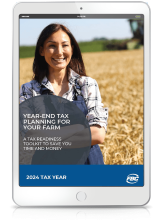Contents
Last updated: Dec. 7, 2022
There is no dollar that isn’t hard-earned when you work in agriculture. That’s why it’s critical to use every tool available to lower your tax burden, including tax credits.
Below, we outline tax credits that may help farmers, livestock producers, and agri-businesses pay less tax, but first, let’s explore the differences between tax deductions and tax credits.
How to apply tax deductions versus tax credits
Tax deductions or tax “write-offs” are allowable business expenses that lower your taxable income before tax is applied. A tax credit will directly reduce the final amount of tax you must pay to the Canada Revenue Agency (CRA).
On a farm, tax deductions can include everything from clearing, levelling, and draining land to freight costs, custom work to fertilizer, to business use of home expenses if you have a home office.
It’s important to understand that the total impact of your deduction on your taxable income depends on your variable tax rate – this means it will always be calculated as a percentage. You must also claim tax deductions in the same tax year the expense was incurred.
In general, tax credits are also calculated as a percentage of the total amount you paid. For example, if you are an unincorporated farmer and you donate $150 to a charitable organization, your tax credit would be 15% of that amount ($22.50).
Unlike deductions, credits reduce the amount of tax owed on a dollar-for-dollar basis. For example, if you had $100 worth of combined tax credits, you would subtract $100 from your total tax owed.
To learn more about agriculture and farm deductions, please see our blog “Tax deductions for Canadian farmers.” To learn more about tax credits, please keep reading.
Tax credits for farmers, livestock producers, and agribusinesses
Return of Fuel Charge Proceeds to Farmers Tax Credit
The Return of Fuel Charge Proceeds to Farmers Tax Credit is a refundable credit on fuel charge proceeds from the federal carbon pricing system (commonly referred to as the federal “carbon tax”). Eligible farming businesses, including self-employed farmers, need to be earning farm income and incur total farming expenses of at least $25,000 or more qualify.
The program is only made available to farm businesses in the following provinces that do not currently have a carbon pricing system that meets the federal requirements: Ontario, Manitoba, Saskatchewan, and Alberta.
For more information, please visit the CRA website or speak to your tax professional about how to claim the credit.
Investment Tax Credits
According to CRA rules, farmers may be eligible to claim one of the following investment tax credits (ITC) if any of the following applies:
- You bought certain new buildings, machinery, or equipment and they were used in certain areas of Canada in qualifying activities such as farming, fishing, logging, manufacturing, or processing (see Atlantic investment tax credit)
- You have done work that qualifies for scientific research and experimental development (SR&ED) tax incentives (see Scientific research and experimental development tax incentive)
- You employ an eligible apprentice and want to claim an Apprenticeship Job Creation Tax Credit
- You have unclaimed credits earned in the last 10 years
What if you qualified for investment tax credits, but did not claim them? You can carry forward credits earned in tax years that end after 1997 for up to 20 years. You can also carry back the credit you earn for up to 3 years. You may be able to claim a refund of your unused ITCs as well.
There are eligibility rules and requirements that must be met before claiming investment tax credits, so consult a tax professional to ensure you’re following the rules.
Here is some additional information about the most common ITCs:
1. Atlantic Investment Tax Credit
This credit support investments in qualified property – like equipment, buildings, and machines – mainly used for farming or fishing, logging, manufacturing, processing, storing grain, or harvesting peat.
Investments in newly acquired property used mainly in Atlantic Canada and the Atlantic Region are calculated using a specified percentage of 10%. If you farm or store grain in that region, please visit the CRA website for more details.
2. Scientific Research and Experimental Development Tax Credit
The Scientific Research and Experimental Development Tax Credit (SR&ED) program allows you to deduct scientific research and development expenses to reduce your taxable income.
Your SR&ED investment tax credit will be at least 15% for individuals and can be as much as 35% of your qualified expenditures for farm corporations. As with any ITCs, you can carry them back 3 years or forward 20 years and apply them against tax payable for other years.
According to the CRA, to claim the Scientific Research and Experimental Development (SR&ED) investment tax credit (ITC), the work must meet two requirements:
- The work is conducted for the advancement of scientific knowledge or to achieve a technological advancement, and,
- The work is a systematic investigation or search that is carried out in a field of science or technology utilizing experiment or analysis
For more information on the SR&ED, you can consult the CRA guidelines. Depending on where you live, you may also qualify for additional tax credits and grants through provincial governments and territories.
3. Apprenticeship Job Creation Tax Credit
If you own a farm or agribusiness that has hired an apprentice, you can claim 10% of their wages, up to a maximum of $2,000 per eligible employee.
An eligible apprentice is someone who works for you in a qualifying trade in the first two years of their field of expertise. Any unused credit can be carried back 3 years and carried forward up to 20 years (to help offset larger tax bills).
To learn more about this tax credit, please visit the CRA website.
Levy and check-off fees count
If you are a farmer and contribute to Research and Development (R&D) through paying check-offs or levies to provincial agricultural organizations, then you can claim a portion of that expense on your federal taxes as an SR&ED credit.
These qualify for the SR&ED tax credit because these provincial organizations invest a portion of the fees they collect into R&D at a CRA-approved research facility, for activities like agronomic studies or breeding programs.
As the percentage eligible to claim varies for each organization depending on how much of this money they invest in R&D each year, it is best to check with them directly about eligibility. To calculate how much you paid, consult your grain ticket or sales receipt. Again, you can only claim this if you have paid your check-off or levy – not if you filed for a refund for these fees.
Whether you’re trying to claim your check-off dollars or wondering if you can claim your R&D for your operation, SR&ED tax credits have many complex rules around eligibility. As always, it’s best to talk to a tax professional before applying them or incurring expenses that may not qualify for the credit.
Charitable Tax Credit
As an unincorporated farmer or individual, you will receive a tax credit for charitable donations.*
Before making a charitable donation, you should determine the eligible amount you can claim as a tax credit and confirm that the registered charity meets all CRA requirements.
For example, Amanda donates $1,000 to her local minor hockey team (which is also a registered charity) on behalf of her unincorporated farm. As a “thank you,” she receives free tickets to the team’s silent auction fundraiser that are valued at $150. In this case, Amanda received an advantage of $150 and therefore the eligible amount of the gift is only $850 ($1,000 – $150 = $850).
According to the CRA, once you determine your donations are eligible, in any one year you can claim:
- Donations made by December 31 of the applicable tax year
- Any unclaimed donations made in the previous five years
- Any unclaimed donations made by your spouse or common-law partner in the year or the previous five years.
You can claim eligible amounts of gifts up to a limit of 75% of your net income; gifts of certified cultural property or ecologically sensitive land can be claimed up to 100% of your income.
There are two charitable tax credits: one rate for the federal government and one rate for the province or territory in which you live. Use the charitable donation tax credit rates table to calculate your credit.
The CRA provides the following example to illustrate how this calculation works. A donor in Alberta with a taxable income of $40,000 donates $700 in 2022. Their tax credit is calculated as the total of:
| Federal credit calculation | Tax credit value |
| 15% on the first $200 | $30 |
| 29% on the remaining $500 | $145 |
| Total federal credit | $175 |
| Provincial credit calculation | Tax credit value |
| 10% on the first $200 | $20 |
| 21% on the remaining $500 | $105 |
| Total provincial credit | $125 |
| Total federal credit | Total provincial credit | Total charitable tax credit |
| $175 | $125 | $300 |
The total charitable donation tax credit for 2022 in this example is $300. To learn more about how to calculate your charitable tax credits and see other examples, visit the CRA website.
It is also worth investigating if there are any local or provincial donation programs specifically for farmers. For example, BC farmers who donate qualifying agricultural products to a food-related charity (school lunch program, food bank, etc.) can qualify for the farmers’ food donation tax credit.
*Please note, charitable donations are a Division C tax deduction for incorporated businesses. If you have any questions about donations and their tax implications, please speak to a tax professional.
Input Tax Credit
If you have a registered GST/HST number, you may be eligible to recover GST/HST paid or payable on purchases and expenses related to your farm business, by claiming input tax credits.
To claim this credit, keep track of GST/HST paid on all eligible farm business expenses so that you can claim them when you file your GST/HST return. Be sure to keep your receipts should you be required to back up your claims.
Resource: 7 simple ways to organize your receipts
What expenses are eligible for input tax credits?
To claim an input tax credit, the expense(s) must be reasonable in quality, nature, and cost in relation to the nature of your farm operation or agribusiness. According to the CRA’s website, the following expenses may be eligible for input tax credits:
- Business-use-of-home expenses
- Delivery and freight charges
- Fuel costs
- Legal, accounting, and other professional fees
- Maintenance and repairs
- Meals and entertainment (allowable part only)
- Motor vehicle expenses
- Office expenses
- Rent
- Telephone and utilities
- Travel
The following expenses are NOT eligible for the input tax credit:
- Certain capital property
- Taxable supplies of property and services bought or imported to make exempt supplies of property and services
- Membership fees or dues to any club whose main purpose is to provide recreation, dining, or sporting facilities (including fitness clubs, golf clubs, and hunting and fishing clubs), unless you acquire the memberships to resell in the course of your business
- Property or services you bought or imported for your personal consumption, use, or enjoyment
[Free Download] Year-End Tax Planning for your Farm
Engaging in tax planning now allows you to get organized and assess what cost-saving actions you can take before tax year-end to lower your future business or corporate taxes next spring.
Consider this toolkit your roadmap to help you get organized, reduce your tax burden, and keep more money in your pocket. In here you’ll find some of the most successful year-end tax planning strategies we employ for our tax Members who farm or own agribusinesses.
Want to learn more?
With more than 70 years of Canadian tax experience, we offer unlimited corporate tax preparation help, support and tax advice for one flat fee. Our tax experts will run the numbers to create a custom T2 corporate tax return that helps minimize headaches and maximize your tax savings.
Leave your unique tax situation to us. We’ll get you every dollar you deserve. Book online or call us at 1-800-265-1002.







